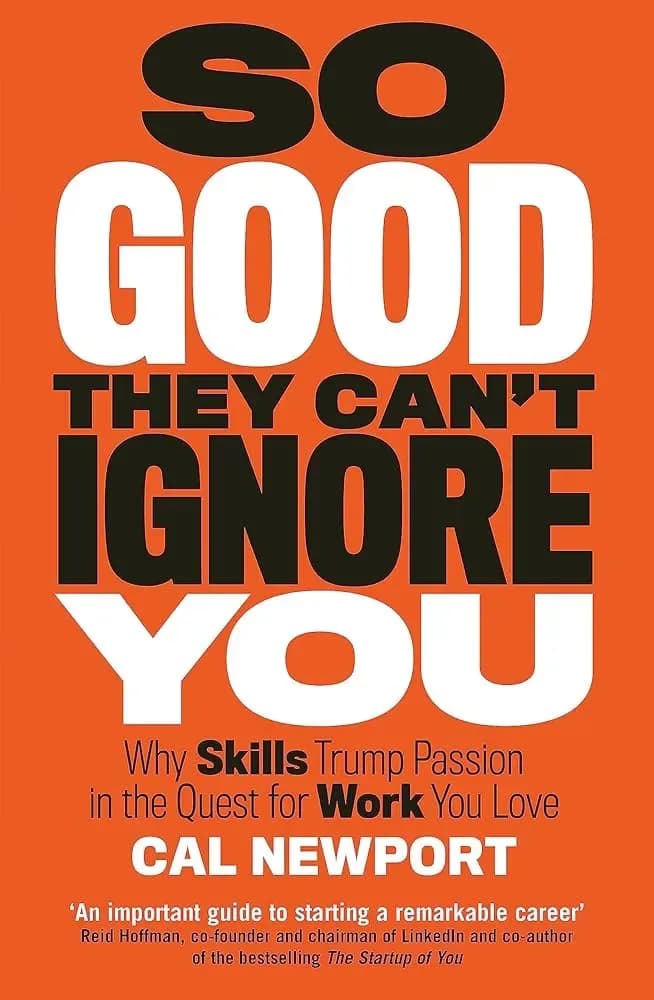 Cover for the book, “So Good They Can’t Ignore You
Cover for the book, “So Good They Can’t Ignore You
Preface
I’ve often read and found that writing helps to consolidate one’s thoughts and allow the time for one to reflect on daily happenings. In the hustle and bustle of a 9-to-5, I find that there is much solace in being able to pause and think about what is happening in the present rather than focusing on the next available task.
With that in mind, I created this blog in hopes that I would be able to return to a state of mind which I once embodied as a child; being able to tap into the creative aspects of my mind and take the opportunity to consolidate my thoughts despite an arduous workday. In that same vein, I also hope that a consolidation of my thoughts will allow me to clear my mind to practice continuous improvement, and allow for this mindset to permeate into different facets of my life, such as in eloquence and writing. This also brings me to my consolidated thoughts for today: a brief comment on So Good They Can’t Ignore You by Cal Newport.
Part 1 of the Book
To summarize what I have read till present (with some missed nuance as I write from pure recollection), Cal Newport speaks of how skill should take much stronger precedence over passion by bringing in numerous examples of how famous individuals who have achieved success generally do not follow the path of perceived “passion”, instead looking towards their strong suits embodying constant self-improvement for a more fulfilling career. Cal Newport thus presents a strong advocacy for the “Craftsmans Mindset” instead of the “Passion Mindset”, which talks of artisans and their mindset to possess a commitment to excellence and continuous improvement. I first chose to start reading this book because I resonated with the idea that “Follow your passion” seemed rather foolish; The idea that people would be able to pursue their “passions” would never come to fruition for a majority of people, and seeking that sense of fulfillment in a career, to me, was always a heavy gamble that could leave one either without money or without the passion they once started with.
Interestingly, the idea of being “So good they can’t ignore you” is hard to translate into different fields, as simple as the phrase may seem. I came across a discussion post today on what separates a good software engineer from a great one, and there was much discourse on the topic. One side mentioned that given the everchanging nature of software and tech-related fields, a great software engineer is one who constantly humbles himself and is always willing to learn newer technologies— one who is able to adapt quickly to change; while another mentioned that a great software engineer is one who is able to break down built in frameworks or existing tools into the smallest building blocks of code (implement everything from scratch themselves) and be confident in their own code. Of course, I believe that both arguments have merit in their own right; one focusing on the technical aspect of “greatness” and another focusing on the “attitude” that comes with being great.
Regardless of what one may feel being good enough dictates in their respective fields, I hope to be able to embody the concept of self-improvement, be it starting from improving my eloquence in writing and communication to more technical level skills such as my confidence and knowledge in code and technical frameworks, I also hope to be able to constantly look to be passionate about learning new things and I hope this blog proves a strong starting point in my journey of self-learning.
Unfortunately, I find that due to the rust that comes with writing after what feels like decades since I’ve written as a wee teenager, my skills in conveying what I want to present in words has heavily deteriorated. Perhaps one day I will be able to reflect on this article and observe my improvement then.
After finishing the book
Ultimately, the book revolves around the perception of the focus on constantly accumulating career capital, on how it should be a pivotal focus in ones life and career instead of focusing on ones perceived passions. To focus on what the world can offer you instead of what you can offer the world will result in chronic unhappiness based off the hyperfixation on what the world lacks instead.
Naturally, with the glorification of pursuing ones “passions” winning out in popular forms of media: For example, a man quits his boring 9-5 desk job to become a musician and ultimately makes it big in the world is one of the more common tropes behind movies that I’ve observed; It’s plentiful refreshing to observe a cynical and realistic outlook on being “successful”.
This book, much like other self-help-ish advice books such as Atomic Habits follow the same structural formula: Give advice from a personal perspective, speaking as though they are a friend giving advice and then providing evidence from people they’ve interviewed or consulted to validate their statements. Overall, I enjoyed the book and this did give me renewed perspective on career capital and how work trumps passion, and I’m confident that reading the book would be great for the average salaryman thinking about quitting his job to pursue his passions. Do pick up the book if the title attracts you; the title was one of the largest selling points for me: since I resonated with the goal of the title!